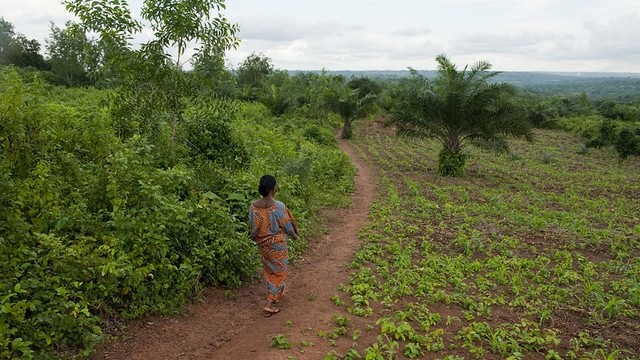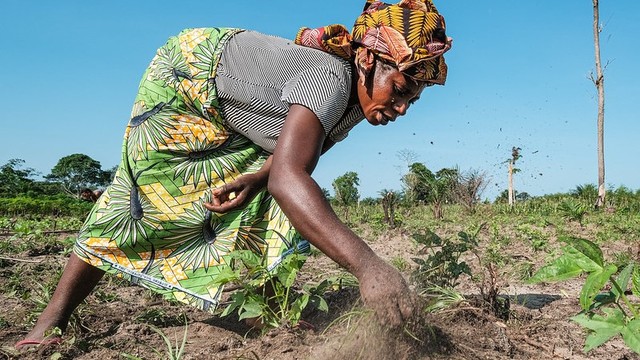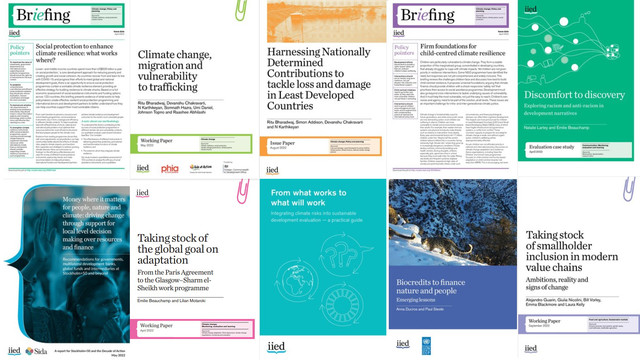IIED's best of 2021: videos
IIED produced more than 220 videos this year, ranging from award-nominated animations to a video-focused annual review and a fully online, high-profile Barbara Ward Lecture. Here are 10 of the best.


Screenshots from IIED's best videos
After 2020 saw a significant increase in how video was used in a variety of ways to communicate sustainable development issues in the wake of COVID-19, that trend continued over the past 12 months.
We again clocked up almost 100,000 views on IIED’s YouTube channel over the course of the year. That translates to around 100 more hours being watched and our viewers, on average, watched 5% longer than previously.
Perhaps that isn’t a surprise as, to accompany the huge rise in online events due to travel restrictions imposed by the pandemic, we’ve worked hard to make those events more accessible to audiences who might not have been able to attend by providing edited recordings wherever possible. We’ve also invested time and resources into providing a larger number of subtitles and translations for our videos.
There was some reward for our video efforts earlier this month when one of a series of climate change animations was nominated in the Charity Film Awards (public voting closes on 12 January).
What’s more, a hard-hitting film telling the stories of Nairobi’s urban refugees in their own words won best documentary at the Eldoret Film Festival. The film, which was edited and directed by young people, mostly from Nairobi’s informal settlements who received training and other mentoring support from Know Your City TV (KYCTV) and Koch Films, was launched at an event organised by IIED.
Learning lessons
While the bulk of the increase in the number of videos produced by IIED this year can be attributed to the rising number of online events, we have also continued to enhance what we offer and experiment with new formats and features. Our external events officer Juliette Tunstall shared some of those lessons, which included a greater geographical diversity of participants and the doubling of non-UK based speakers through video webinars.
These lessons have also been shared internally, thanks to the creation of an event resources hub and sessions where staff have shared their event experiences and lessons with their peers.
This includes how switching an event to be run digitally can make it better; in one example, what was first a frustration became a benefit because it allowed us to better design the event to have a greater focus on Indigenous communities.
The challenge for the coming year will be how to ensure our online events and videos are more accessible to people who struggle to access them, whether due to internet connectivity problems, cost or other issues.
We will also be looking at how we devise properly hybrid events, where those online and following by video have as much as possible an identical experience to anyone present in person in the room, with just as much engagement and interaction.
Our top 10 of the year is:
1
Untold stories of climate change loss and damage in the LDCs
Our most watched new videos in 2021 were the series of three animations telling the devastating reality of climate change loss and damage faced by people living in the least developed countries, who narrated the videos themselves about their own stories.
The first animation focused on the Solomon Islands (our most-watched single video of the year), and there were further films from Sierra Leone and Rwanda.
Made with The Like Minded agency, an additional feature of the series was that the videos were translated into Pijin, Krio and Kinyarwanda, depending on the audience, and each animation was accompanied by a behind-the-scenes explainer. A fourth animation, focusing on Nepal, will be published next year.
2
2021 Barbara Ward Lecture, with Rebeca Grynspan
Although the resurgence of the coronavirus pandemic put paid to plans for the 2021 Barbara Ward Lecture to take place in person, an audience from around the world tuned in to hear from Rebeca Grynspan, the secretary-general of the United Nations Conference on Trade and Development (UNCTAD), in early December.
The lecture series celebrates IIED's founder, Barbara Ward, a distinguished economist, journalist, and policy advisor who was among the earliest advocates of sustainable development. Former Costa Rica vice-president Grynspan used the platform to trace her country’s transformation from being a poor country of smallholder farmers to a world leader on sustainable development and climate change. The lecture is also available with Spanish interpretation.
3
2020 annual review: Sharing nature-based solutions for climate and biodiversity
In February we launched our 2020 annual review containing a strong video element. There were seven videos in all, recorded from around the world, giving our researchers and partners the opportunity to tell the story of how they continued to work together for a better future for all.
This video focusing on nature-based solutions was the most visited of the series from searches on Google, and shows how we supported local communities including forest and farm producers to implement nature-based solutions and ensure those local change-makers are heard in international debates.
4
Time to make change happen
2021 was hailed as a 'super year': a crucial 12 months for dealing with the climate emergency, unprecedented biodiversity loss, rising inequalities and the COVID-19 pandemic.
Working with Nice and Serious, at the start of the year we produced a short film outlining how IIED and its varied partners would deliver excellent research to show how conserving biodiversity protects livelihoods as well as nature and to get money where it matters so poorer communities can access funds and adapt to climate change – because these communities know what works.
The video was also shown regularly at the start of IIED’s online events.
5
Green in my meals: a story from the Philippines
We often use videos to provide a more personal connection to a story or the storyteller. In July, Ofelia Bagotlo, a founding member of the Homeless People's Federation of the Philippines, wrote about how community gardens on vacant city plots were providing vital nutrition for the urban poor, and this was accompanied by a video with her and the Quezon City mayor providing further insight and images from the work carried out.
The blog by Bagotlo was part of a series, curated by IIED senior associate David Satterthwaite, examining different aspects of global urban change, and followed an article that described community-led COVID-19 responses in the Philippines that was one of IIED’s most read blogs of the year.
6
Increasing climate information and resilience in India
Animations again proved effective in 2021; they provide a simple way to convey complex information and also prove popular with audiences.
Our latest animation focuses on the launch of the Climate Resilience Information System and Planning (CRISP-M) tool. This was launched during the UN climate summit (COP26) in November and has been designed to enhance the climate resilience impacts of the Mahatma Gandhi National Rural Employment Guarantee Scheme (MGNREGS) in India.
Another animation from this year shows the contribution of small-scale artisanal fisheries and aquaculture to food systems. It was based on an infographic produced for World Oceans Day in June.
7
IIED Debates: COP26 debrief
The IIED Debates series of events convenes expert speakers to offer insight into the world’s most pressing challenges, and the 12 that took place in 2021 ranged from exploring why people eat wild meat to how special drawing rights can be reallocated to support climate-vulnerable countries and how to make a digital world more gender inclusive.
In late November hundreds of people joined the event reflecting on the outcomes of COP26 and how they responded to the priorities of the 46 least developed countries. It featured former senior Burkina Faso negotiator Mamadou Honadia, policy adviser and climate negotiator Tara Shine and Madeleine Diouf Sarr, head of the climate change division in Senegal's Ministry of Environment and Sustainable Development and the incoming chair of the LDC Group.
8
"Poor governance is worse than drought"
A new series launched this year saw IIED researchers introduce their work by making connections to sectors and ideas that challenge established thinking on sustainable development.
Developed for the Swedish International Development Cooperation Agency (Sida) but made available to all, the narrated presentations are a deep dive into subjects that might surprise, such as why water development in East Africa is about power and governance as much as infrastructure and availability.
9
Scaling up locally-led adaptation
With increasing calls for radical improvements in the access to climate finance for the world’s most vulnerable countries, and the need to increase support for locally-led adaptation, IIED supported the compilation of a series of video case studies ahead of COP26.
The case studies were created for a series of dialogues on scaling up locally-led adaptation, which were presented by the Adaptation Action Coalition, in association with the UN High-Level Champions and Race to Resilience.
The dialogues offer a chance for countries and non-state actors to learn from each other and showcase the real potential for locally-led adaptation via direct and enhanced direct access models.
Eighteen case studies are available so far, with more to come, along with recordings of the six dialogues that were held across the Asia-Pacific, Africa, and the Caribbean and Latin America regions in September and October 2021.
10
Community-based adaptation: what we learned at CBA15
First held in Bangladesh in 2005, the International Conference on Community-Based Adaptation (CBA) has become a staple of the climate change calendar, and has evolved throughout that time.
This year’s 15th conference in June, a week-long event, was again held completely online. And one new development saw organisers look back on the key lessons and reflect on their personal highlights in a live-streamed interview with Doug Parsons, of the popular climate change podcast America Adapts, on Cimpatico’s Climate Adaptation Channel.
You can watch recordings of all 39 sessions from CBA15 in this playlist on IIED’s YouTube channel and also available are 24 sessions focused on climate resilience for all that took place during the 2021 Development and Climate Days.
Video library
These 10 videos are only a selection of the films we hosted during 2021. Watch all of these videos – and many more – on IIED's YouTube channel and subscribe to get alerts when new videos are uploaded.
Previous years
Click on the year to see IIED’s video highlights from the last three years: 2020; 2019; 2018; 2017.



